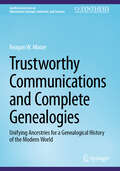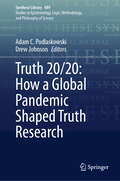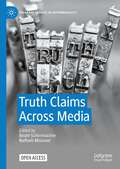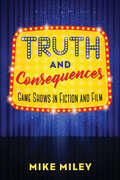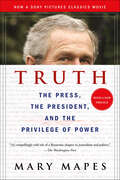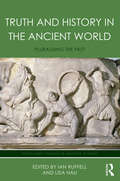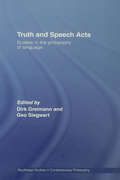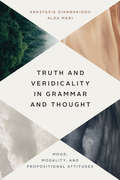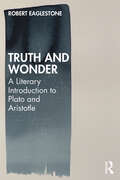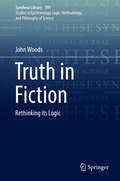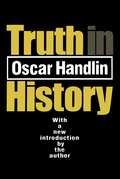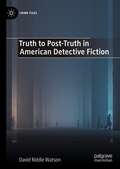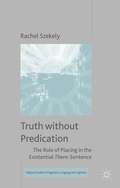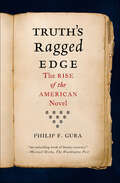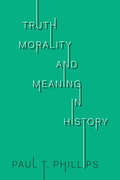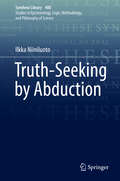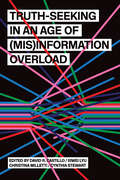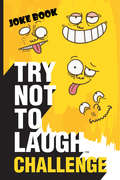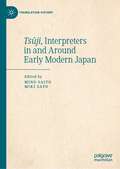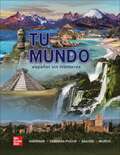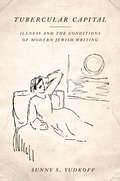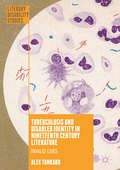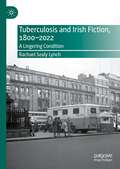- Table View
- List View
Trustworthy Communications and Complete Genealogies: Unifying Ancestries for a Genealogical History of the Modern World (Synthesis Lectures on Information Concepts, Retrieval, and Services)
by Reagan W. MooreThis book explains how all persons with Western European ancestry are related through a Unifying Ancestry. The author presents the knowledge metrics needed to derive the best representation for a Unifying Ancestry. The book uses example lineages to historically notable persons including relationships to U.S. Presidents, royal families, actors, and singers in order to demonstrate these points. This third edition is based upon expanded data, applying the algorithms to validate the Unifying Ancestry to a 348,844-person Research Genealogy. The author successfully demonstrates that a Unifying Ancestry with 38,533 persons is sufficient to identify familial relationships between Western Europeans.
Truth 20/20: How a Global Pandemic Shaped Truth Research (Synthese Library #489)
by Adam C. Podlaskowski Drew JohnsonThis book offers a collection of papers on focal themes in truth research, including minimalism, pragmatism and pluralism, and philosophical logic. It further provides valuable hindsight with contemporary perspectives on the works of Frege, Wittgenstein, Ramsey, Strawson, and Evans on truth, and it features recent discussions on the role and value of truth in politics and political discourse. The collection is based on groundbreaking presentations hosted by the Virtual International Consortium for Truth Research (VICTR), including talks given at the TRUTH 20/20 conference. The volume features exclusive transcriptions of panel discussions on truth and factuality with Huw Price, Douglas Edwards, Cheryl Misak, and Amie Thomasson, and on truth and polarization with Michael Lynch, Maria Baghramian, and Cailin O’Connor. It includes the transcript of a televised 1973 conversation between Peter Strawson and Gareth Evans. And the volume features new contributions from established and early career researchers in the field. Anyone interested in the nature and value of truth will find this volume to be indispensable.
Truth Claims Across Media (Palgrave Studies in Intermediality)
by Beate Schirrmacher Nafiseh MousaviThis book offers an intermedial approach to truthful communication. Bringing together a wide range of media types and interactions from a transmedial perspective, the volume maps out how truth claims are made in different contexts, and how different media promise to create a truthful perception of the social world. The flexible communicative possibilities of digital technology have a significant impact on our perception of truth and truthfulness of communication. Bot accounts, deep fake videos, or AI technology draw attention to how reliable communication is destabilized and questioned. In this unstable climate, binaries such as true/false, authentic/fake and fiction/facts are difficult to apply. Instead, it is crucial to investigate how media products construct truthfulness in different ways. The volume brings together various media types and contexts such as press conferences, documentaries and mockumentaries, images in magazines and on social media, horror movies, biopics, and educational games and explores how truth claims, authenticity discourses, and knowledge communication are established and how they collide, merge, or are confused.This is an open access book.
Truth Is Trickiest: The Case for Ambiguity in the Exeter Book Riddles
by Jennifer NevilleAt the end of the tenth-century English manuscript the Exeter Book, there is a collection of almost one hundred riddles. They are notable for many reasons, but one feature in particular has challenged modern readers: their lack of solutions. In Truth Is Trickiest, Jennifer Neville argues that the absence of solutions, rather than being an unfortunate accident, uncovers an essential quality of these texts. In opposition to the general expectation that a successfully solved riddle will have one correct answer, Neville argues that the Exeter Book riddles are written to generate multiple solutions. The correct response to an Exeter Book riddle is not a single, elegant solution but instead an ongoing process of interpretation that leads readers to question what they think they know. Truth Is Trickiest contextualizes its readings within the larger field of Old English poetry, early medieval material culture, and Anglo-Latin riddles. The book pursues the central issue of interpretation in relation to social values, craftsmanship, hierarchical social structures, violence, irony, humour, and sexuality. It concludes with a full list of previously proposed solutions to document the history of the ongoing argument that the Exeter Book riddles have provoked.
Truth and Consequences: Game Shows in Fiction and Film
by Mike MileyAlthough nearly every other television form or genre has undergone a massive critical and popular reassessment or resurgence in the past twenty years, the game show’s reputation has remained both remarkably stagnant and remarkably low. Scholarship on game shows concerns itself primarily with the history and aesthetics of the form, and few works assess the influence the format has had on American society or how the aesthetics and rhythms of contemporary life model themselves on the aesthetics and rhythms of game shows. In Truth and Consequences: Game Shows in Fiction and Film, author Mike Miley seeks to broaden the conversation about game shows by studying how they are represented in fiction and film. Writers and filmmakers find the game show to be the ideal metaphor for life in a media-saturated era, from selfhood to love to family to state power. The book is divided into “rounds,” each chapter looking at different themes that books and movies explore via the game show. By studying over two dozen works of fiction and film—bestsellers, blockbusters, disasters, modern legends, forgotten gems, award winners, self-published curios, and everything in between—Truth and Consequences argues that game shows offer a deeper understanding of modern-day America, a land of high-stakes spectacle where a game-show host can become president of the United States.
Truth and Duty: The Press, the President, and the Privilege of Power
by Mary MapesA riveting account of how the public's right to know is being attacked by an unholy alliance among politicians, news organizations and corporate AmericaTruth and Duty was made into the 2015 film Truth, starring Cate Blanchett, Robert Redford, Topher Grace and Elizabeth Moss. For twenty five years, Mary Mapes has been an award-winning television producer and reporter -- the last fifteen of them for CBS News, principally for the CBS Evening News with Dan Rather and 60 Minutes. She had the bedrock of respect of her peers -- in 2003 alone, she broke the story of the Abu Ghraib prison tortures (which won CBS The Peabody Award) and the existence of Strom Thurmond's illegitimate bi-racial daughter Essie Mae Washington. But it was Dan Rather's lightning rod of a story on George W. Bush's National Guard Service that brought Mapes into an unwanted limelight. The firestorm that followed the broadcast led not only to Mapes' firing and Rather's stepping down from his anchor chair a year early, but to an unprecedented "internal" inquiry into the story -- chaired by former Reagan Attorney General Richard Thornburgh.Peopled with an historic and colorful cast of characters—from Karl Rove to Summer Redstone to John Kerry to Col. Bobby Hodges -- this groundbreaking book about how the television news is made (and unmade) made headlines itself when first published. But this, it turns out, is only part of the story. Mapes talks for the first time about the riveting behind-the-scenes action at CBS during this frenzied period and exposes some of the largest political and social controversies that have broken in this new age of dissonance.
Truth and History in the Ancient World: Pluralising the Past (Routledge Studies in Ancient History)
by Ian Ruffell Lisa HauThis collection of essays investigates histories in the ancient world and the extent to which the producers and consumers of those histories believed them to be true. Ancient Greek historiographers repeatedly stressed the importance of truth to history; yet they also purported to believe in myth, distorted facts for nationalistic or moralizing purposes, and omitted events that modern audiences might consider crucial to a truthful account of the past. Truth and History in the Ancient World explores a pluralistic concept of truth – one in which different versions of the same historical event can all be true – or different kinds of truths and modes of belief are contingent on culture. Beginning with comparisons between historiography and aspects of belief in Greek tragedy, chapters include discussions of historiography through the works of Herodotus, Xenophon, and Ktesias, as well as Hellenistic and later historiography, material culture in Vitruvius, and Lucian’s satire. Rather than investigate whether historiography incorporates elements of poetic, rhetorical, or narrative techniques to shape historical accounts, or whether cultural memory is flexible or manipulated, this volume examines pluralities of truth and belief within the ancient world – and consequences for our understanding of culture, ancient or otherwise.
Truth and Speech Acts: Studies in the Philosophy of Language (Routledge Studies in Contemporary Philosophy)
by Dirk Greimann Geo SiegwartWhereas the relationship between truth and propositional content has already been intensively investigated, there are only very few studies devoted to the task of illuminating the relationship between truth and illocutionary acts. This book fills that gap. This innovative collection addresses such themes as: the relation between the concept of truth and the success conditions of assertions and kindred speech acts the linguistic devices of expressing the truth of a proposition the relation between predication and truth.
Truth and Veridicality in Grammar and Thought: Mood, Modality, and Propositional Attitudes
by Anastasia Giannakidou Alda Mari PhDCan language directly access what is true, or is the truth judgment affected by the subjective, perhaps even solipsistic, constructs of reality built by the speakers of that language? The construction of such subjective representations is known as veridicality, and in this book Anastasia Giannakidou and Alda Mari deftly address the interaction between truth and veridicality in the grammatical phenomena of mood choice: the indicative and subjunctive choice in the complements of modal expressions and propositional attitude verbs.Combining several strands of analysis—formal linguistic semantics, syntactic theory, modal logic, and philosophy of language—Giannakidou and Mari’s theory not only enriches the analysis of linguistic modality, but also offers a unified perspective of modals and propositional attitudes. Their synthesis covers mood, modality, and attitude verbs in Greek and Romance languages, while also offering broader applications for languages lacking systematic mood distinction, such as English. Truth and Veridicality in Grammar and Thought promises to shape longstanding conversations in formal semantics, pragmatics, and philosophy of language, among other areas of linguistics.
Truth and Wonder: A Literary Introduction to Plato and Aristotle
by Robert EaglestoneTruth and Wonder is an accessible introduction to Plato and Aristotle, showing their crucial influence for literary and cultural studies, modern languages and related disciplines. It focusses on both what Plato and Aristotle say about literature and how they say it, and so demonstrates the ways their philosophies still shape our reading, thinking and living. In the clear and engaging style for which he has become known, Robert Eaglestone uses Plato and Aristotle’s literary qualities to explain their thought. He presents Plato’s ideas through the metaphors, stories and style of his dialogues, and Aristotle’s ideas through the significance of narrative. Truth and Wonder draws on a wide range of thinkers including Hannah Arendt, Martin Heidegger, Jacques Derrida and Martha Nussbaum, and a number of canonical writers including Phillip Sidney, Percy Shelley, Ngũgĩ wa Thiong’o and Iris Murdoch with examples that will be familiar to students. The ideas of Plato and Aristotle underlie much of Western culture, continue to inspire contemporary literary and philosophical work and shape the case for the central importance of the humanities today. Truth and Wonder is essential reading for students and researchers in the study of literature, theory and criticism as well as for those wishing to understand the foundations of the field. It will also be of interest to those studying philosophy, classics and political theory. Its accessible style and approach also mean it’s a perfect starting point for any literary-minded person who wants to know more about these two foundational thinkers.
Truth in Fiction: Rethinking Its Logic (Synthese Library #391)
by John WoodsThis monograph examines truth in fiction by applying the techniques of a naturalized logic of human cognitive practices. The author structures his project around two focal questions. What would it take to write a book about truth in literary discourse with reasonable promise of getting it right? What would it take to write a book about truth in fiction as true to the facts of lived literary experience as objectivity allows?It is argued that the most semantically distinctive feature of the sentences of fiction is that they areunambiguously true and false together. It is true that Sherlock Holmes lived at 221B Baker Street and also concurrently false that he did. A second distinctive feature of fiction is that the reader at large knows of this inconsistency and isn’t in the least cognitively molested by it. Why, it is asked, would this be so? What would explain it?Two answers are developed. According to the no-contradiction thesis, the semantically tangled sentences of fiction are indeed logically inconsistent but not logically contradictory. According to the no-bother thesis, if the inconsistencies of fiction were contradictory, a properly contrived logic for the rational management of inconsistency would explain why readers at large are not thrown off cognitive stride by their embrace of those contradictions. As developed here, the account of fiction suggests the presence of an underlying three - or four-valued dialethic logic. The author shows this to be a mistaken impression. There are only two truth-values in his logic of fiction.The naturalized logic of Truth in Fiction jettisons some of the standard assumptions and analytical tools of contemporary philosophy, chiefly because the neurotypical linguistic and cognitive behaviour of humanity at large is at variance with them. Using the resources of a causal response epistemology in tandem with the naturalized logic, the theory produced here is data-driven, empirically sensitive, and open to a circumspect collaboration with the empirical sciences of language and cognition.
Truth in History (Harvard Paperbacks Ser.)
by Oscar HandlinLike scholars in other fields, historians have long occupied themselves in self-justification. In a society which calibrates all measures by a single standard, the proof of scientific worth became relevance, which in turn was interpreted as a search not for truth but for political correctness. In a blistering professional critique of this tendency in academic scholarship, perhaps the first of its kind, Oscar Handlin offers an analysis that, if anything, has grown more pertinent over the past decade.In seventeen chapters, written with the brilliant assurance of a master craftsman, Handlin shows why the turn to partisanship and meaning has undermined the calling of historical research. As his new introduction makes clear, partisanship has taken the best and brightest from the field into different callings. Both widely heralded upon its initial appearance as well as attacked with vigor, Truth in History emanates from a half-century's experience of reading, writing, teaching, researching, and publishing in history and related disciplines. The passage of time has only confirmed the concerns of Handlin and the accuracy of his predictions for the field. This book will be valuable for sociologists, economists, political scientists, and historians. It is a must read for those who contemplate a life of scholarship in liberal arts.
Truth or Truthiness
by Howard WainerTeacher tenure is a problem. Teacher tenure is a solution. Fracking is safe. Fracking causes earthquakes. Our kids are over-tested. Our kids are not tested enough. We read claims like these in the newspaper every day, often with no justification other than 'it feels right'. How can we figure out what is right? Escaping from the clutches of truthiness begins with one simple question: 'what is the evidence?' With his usual verve and flair, Howard Wainer shows how the sceptical mindset of a data scientist can expose truthiness, nonsense, and outright deception. Using the tools of causal inference he evaluates the evidence, or lack thereof, supporting claims in many fields, with special emphasis in education. This wise book is a must-read for anyone who has ever wanted to challenge the pronouncements of authority figures and a lucid and captivating narrative that entertains and educates at the same time.
Truth to Post-Truth in American Detective Fiction (Crime Files)
by David Riddle WatsonTruth to Post-Truth in American Detective Fiction examines questions of truth and relativism, turning to detectives, both real and imagined, from Poe’s C. Auguste Dupin to Robert Mueller, to establish an oblique history of the path from a world where not believing in truth was unthinkable to the present, where it is common to believe that objective truth is a remnant of a simpler, more naïve time. Examining detective stories both literary and popular including hard-boiled, postmodern, and twenty-first century novels, the book establishes that examining detective fiction allows for a unique view of this progression to post-truth since the detective’s ultimate job is to take the reader from doubt to belief. David Riddle Watson shows that objectivity is intersubjectivity, arguing that the belief in multiple worlds is ultimately what sustains the illusion of relativism.
Truth without Predication: The Role of Placing in the Existential There-Sentence
by Rachel SzekelyThis book contains an original analysis of the existential there-sentence from a philosophical-linguistic perspective. At its core is the claim that there-sentences' form is distinct from that of ordinary subject-predicate sentences, and that this fundamental difference explains the construction's unusual grammatical and discourse properties.
Truth's Ragged Edge: The Rise of the American Novel
by Philip F. GuraFrom the acclaimed cultural historian Philip F. Gura comes Truth's Ragged Edge, a comprehensive and original history of the American novel's first century. Grounded in Gura's extensive consideration of the diverse range of important early novels, not just those that remain widely read today, this book recovers many long-neglected but influential writers—such as the escaped slave Harriet Jacobs, the free black Philadelphian Frank J. Webb, and the irrepressible John Neal—to paint a complete and authoritative portrait of the era. Gura also gives us the key to understanding what sets the early novel apart, arguing that it is distinguished by its roots in "the fundamental religiosity of American life." Our nation's pioneering novelists, it turns out, wrote less in the service of art than of morality.This history begins with a series of firsts: the very first American novel, William Hill Brown's The Power of Sympathy, published in 1789; the first bestsellers, Susanna Rowson's Charlotte Temple and Hannah Webster Foster's The Coquette, novels that were, like Brown's, cautionary tales of seduction and betrayal; and the first native genre, religious tracts, which were parables intended to instruct the Christian reader. Gura shows that the novel did not leave behind its proselytizing purpose, even as it evolved. We see Catharine Maria Sedgwick in the 1820s conceiving of A New-England Tale as a critique of Puritanism's harsh strictures, as well as novelists pushing secular causes: George Lippard's The Quaker City, from 1844, was a dark warning about growing social inequality. In the next decade certain writers—Hawthorne and Melville most famously—began to depict interiority and doubt, and in doing so nurtured a broader cultural shift, from social concern to individualism, from faith in a distant god to faith in the self.Rich in subplots and detail, Gura's narrative includes enlightening discussions of the technologies that modernized publishing and allowed for the printing of novels on a mass scale, and of the lively cultural journals and literary salons of early nineteenth-century New York and Boston. A book for the reader of history no less than the reader of fiction, Truth's Ragged Edge—the title drawn from a phrase in Melville, about the ambiguity of truth—is an indispensable guide to the fascinating, unexpected origins of the American novel.
Truth, Reality, and Meaning in History (UTP Insights)
by Paul T. PhillipsIn this important new book, Paul T. Phillips argues that most professional historians – aside from a relatively small number devoted to theory and methodology – have concerned themselves with particular, specialized areas of research, thereby ignoring the fundamental questions of truth, morality, and meaning. This is less so in the thriving general community of history enthusiasts beyond academia, and may explain, in part at least, history’s sharp decline as a subject of choice by students in recent years. Phillips sees great dangers resulting from the thinking of extreme relativists and postmodernists on the futility of attaining historical truth, especially in the age of "post-truth." He also believes that moral judgment and the search for meaning in history should be considered part of the discipline’s mandate. In each section of this study, Phillips outlines the nature of individual issues and past efforts to address them, including approaches derived from other disciplines. This book is a call to action for all those engaged in the study of history to direct more attention to the fundamental questions of truth, morality, and meaning.
Truth-Seeking by Abduction (Synthese Library #400)
by Ilkka NiiniluotoThis book examines the philosophical conception of abductive reasoning as developed by Charles S. Peirce, the founder of American pragmatism. It explores the historical and systematic connections of Peirce's original ideas and debates about their interpretations. Abduction is understood in a broad sense which covers the discovery and pursuit of hypotheses and inference to the best explanation. The analysis presents fresh insights into this notion of reasoning, which derives from effects to causes or from surprising observations to explanatory theories.The author outlines some logical and AI approaches to abduction as well as studies various kinds of inverse problems in astronomy, physics, medicine, biology, and human sciences to provide examples of retroductions and abductions. The discussion covers also everyday examples with the implication of this notion in detective stories, one of Peirce’s own favorite themes.The author uses Bayesian probabilities to argue that explanatory abduction is a method of confirmation. He uses his own account of truth approximation to reformulate abduction as inference which leads to the truthlikeness of its conclusion. This allows a powerful abductive defense of scientific realism. This up-to-date survey and defense of the Peircean view of abduction may very well help researchers, students, and philosophers better understand the logic of truth-seeking.
Truth-Seeking in an Age of (SUNY series, Humanities to the Rescue)
by David R. Castillo, Siwei Lyu, Christina Milletti, and Cynthia StewartThe unprecedented spread of false and misleading information is the flip side of the Internet's promise of universal access and information democratization. This volume features original contributions from scholars working on the challenge of misinformation across a wide range of STEM, humanities, and art disciplines. Modeling a collaborative, multidisciplinary "convergence approach," Truth-Seeking in an Age of (Mis)Information Overload is structured in three parts. Part 1, "Misinformation and Artificial Intelligence," confronts the danger of outsourcing judgement and decision-making to AI instruments in key areas of public life, from the processing of loan applications to school funding, policing, and criminal sentencing. Part 2, "Science Communication," foregrounds the need to rethink how scientific findings are communicated to the public, calling on scientists to cooperate with colleagues in other disciplines and community representatives to help minimize the negative effects of mis/disinformation in such vital areas as climate change science and public health. Part 3, "Building Trust," further advocates for and explores instances of trust-building initiatives as a necessary precondition of both community-oriented scholarly activity and effective intervention strategies in high impact areas such as public health.
Try Not to Laugh Challenge Joke Book: Funny, Silly and Corny Jokes for Kids - First to Laugh 3 Times Loses!; Boys and Girls Gift Ideas for Ages 6, 7, 8, 9, 10, 11, and 12 Year Old; Christmas Stocking Stuffers and Toys for Children (Try Not to Laugh Series #2)
by Crazy CoreyGREAT GIFT FOR KIDS! Sneak peek at our Try Not to Laugh Challenge jokes: Did you hear about the golfer’s socks? There was a hole-in-one! That is just one of many hilarious jokes this book has to offer! Invite friends and family to sit down, take turns reading jokes aloud, and trying NOT to laugh at these corny jokes! Our book includes 3 levels for both our Silly and Corny categories along with our twisty Tongue Twisters! Grab one for your kiddos or give it as an interactive gift. Before you know it everyone will be competing to be named the ‘Laugh Champion’!
Tsūji, Interpreters in and Around Early Modern Japan (Translation History)
by Mino Saito Miki SatoThis book introduces English-speaking audiences to tsūji, who were interpreters in different contexts in Japan and then the Ryukyu Kingdom from the late 16th to the mid-19th century. It comprises seven historical case studies on tsūji in which contributors adopt a context-oriented approach. They aim to explore the function of these interpreters in communication with other cultures in different languages, including Japanese, Dutch, Chinese, Korean, Ryukyuan, English, Russian and Ainu. Each chapter elucidates the tsūji and the surrounding social, political and economic conditions. The book will be of interest to students and scholars of translation and interpreting, but also readers interested in the early modern history of interpreting and cultural exchange. It will similarly appeal to those interested in the Japanese language, but with limited access to books written in Japanese.
Tu mundo
by Magdalena Andrade Jeanne Egasse Elías Miguel Muñoz María José Cabrera-PucheTu mundo immerses the Introductory Spanish classroom in a culturally rich world full of opportunities to discover and explore the powerful connections between language and culture. Instructors are provided user-friendly resources to guide students as they dive into intensive communicative practice, building confidence in their ability to interact in meaningful ways in Spanish. Instructors are also provided with the tools to build a sense of community in face-to-face, hybrid, and online classes, resulting in a unique personal experience that evolves organically and sparks a natural curiosity about their world. The hallmarks of Tu mundo are: Communicative and Flexible: Tu mundo is designed to work well with a variety of communicative approaches. The goal is to provide an ideal environment where acquisition can take place, without fear of making mistakes. By jumping directly into communicative practice, students immerse themselves in the experience of active learning. This involves preparing at home using a variety of learning resources, prepping the necessary vocabulary and grammar in advance, and then coming to class ready to engage in conversation. Consistency and Performance: Tu mundo offers a dynamic adaptive learning tool called Adaptive Learning Assignments that focus students on the grammar and vocabulary they haven’t yet mastered, filling the gaps to prepare them for in-class communication. Community and Connections: Whether in a physical classroom or in an online course via Connect Spanish, students are provided with opportunities to engage in meaningful conversations and collaborative task-based activities that enable students to practice their language skills making connections and understanding the Hispanic world. Meaningful and real-life experience: Culture is often left behind - so Tu mundo offers it throughout. Each chapter features a country of focus, which doubles as the home country of one of the fifteen amigos. In addition to the in-chapter cultural sections, every chapter of Tu mundo features a second video segment called Mi país, narrated by the amigos themselves as they share information about their native countries. This window into the lives of the amigos provides a point of comparison in which students can interact with language and culture in a meaningful way.
Tubercular Capital: Illness and the Conditions of Modern Jewish Writing (Stanford Studies in Jewish History and Culture)
by Sunny S. YudkoffAt the turn of the twentieth century, tuberculosis was a leading cause of death across America, Europe, and the Russian Empire. The incurable disease gave rise to a culture of convalescence, creating new opportunities for travel and literary reflection. Tubercular Capital tells the story of Yiddish and Hebrew writers whose lives and work were transformed by a tubercular diagnosis. Moving from eastern Europe to the Italian Peninsula, and from Mandate Palestine to the Rocky Mountains, Sunny S. Yudkoff follows writers including Sholem Aleichem, Raḥel Bluvshtein, David Vogel, and others as they sought "the cure" and drew on their experiences of illness to hone their literary craft. Combining archival research with literary analysis, Yudkoff uncovers how tuberculosis came to function as an agent of modern Jewish literature. The illness would provide the means for these suffering writers to grow their reputations and find financial backing. It served a central role in the public fashioning of their literary personas and ushered Jewish writers into a variety of intersecting English, German, and Russian literary traditions. Tracing the paths of these writers, Tubercular Capital reconsiders the foundational relationship between disease, biography, and literature.
Tuberculosis and Disabled Identity in Nineteenth Century Literature: Invalid Lives (Literary Disability Studies)
by Alex TankardUntil the nineteenth century, consumptives were depicted as sensitive, angelic beings whose purpose was to die beautifully and set an example of pious suffering – while, in reality, many people with tuberculosis faced unemployment, destitution, and an unlovely death in the workhouse. Focusing on the period 1821-1912, in which modern ideas about disease, disability, and eugenics emerged to challenge Romanticism and sentimentality, Invalid Lives examines representations of nineteenth-century consumptives as disabled people. Letters, self-help books, eugenic propaganda, and press interviews with consumptive artists suggest that people with tuberculosis were disabled as much by oppressive social structures and cultural stereotypes as by the illness itself. Invalid Lives asks whether disruptive consumptive characters in Wuthering Heights, Jude the Obscure, The Idiot, and Beatrice Harraden’s 1893 New Woman novel Ships That Pass in the Night represented critical, politicised models of disabled identity (and disabled masculinity) decades before the modern disability movement.
Tuberculosis and Irish Fiction, 1800–2022: A Lingering Condition (New Directions in Irish and Irish American Literature)
by Rachael Sealy LynchThis book focuses on Ireland’s lived experience of tuberculosis as represented in the nation’s fiction; not surprisingly, the disease both manifests and conceals itself with devastating frequency in literature as it did in life. It seeks to place the history of tuberculosis in Ireland, from 1800 until after its virtual eradication in the mid-Twentieth Century, in conversation with fictional representations or repressions of a condition so fearsome that until very recently it was usually referred to by code words and euphemisms rather than by its name.
